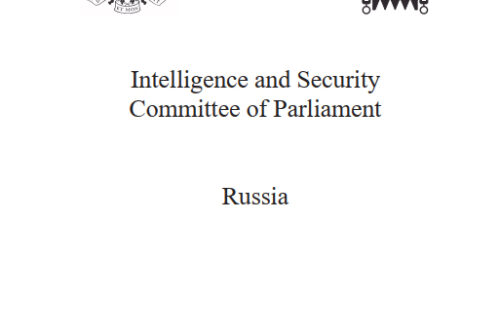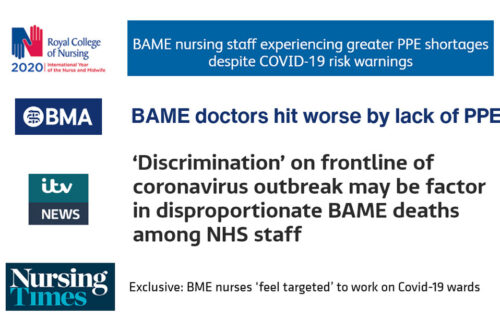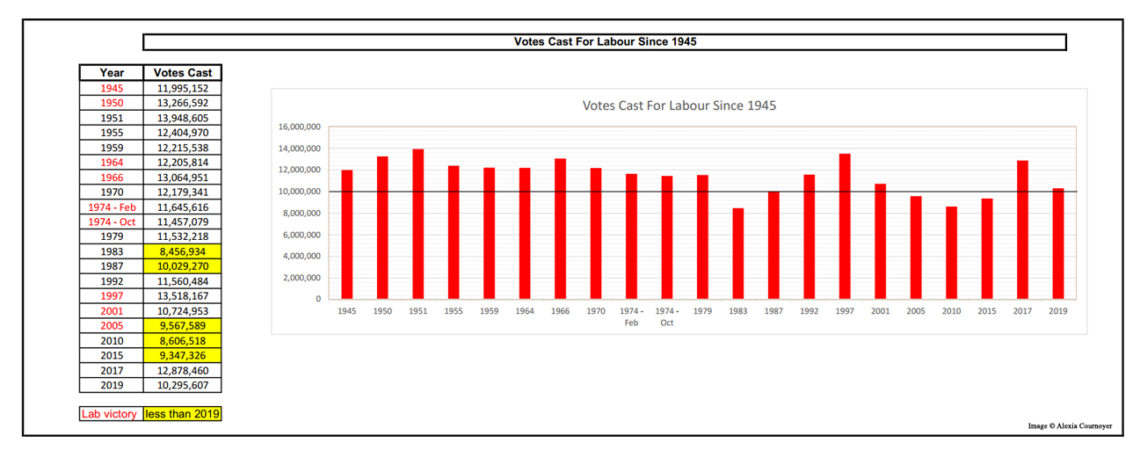
Factors Influencing the 2019 General Election Labour Loss
With all the blame and recriminations floating around on both the traditional and social media, indulge me as I take a moment to look at the context of a selection of the factors that lead to the defeat and some suggestions to counter some of the issues that still confront Labour as it continues to seek to attract the confidence of the electorate.
MPs Undermining the Character and the Authority of the Leader
First of all, the Leader is not the Party. The Party is a collaboration between the PLP and the members. The Leader was elected by the members and the manifesto was accepted by the delegates at conference. It was up to all members of the party, elected and laypeople, to support the Leader and the manifesto. This didn’t happen.
It’s undisputed that since his election, a large proportion of the PLP felt that public disloyalty was acceptable response to the election of a Leader they didn’t approve of. The way they behaved in openly undermining the Leader does them no credit. The silence from most of the PLP in the media during the election period leads me to draw the conclusion that there was a large proportion of MPs who were happy for Labour to lose the election. Certainly the undignified public name calling and blame that, in some cases, started before at least one MP lost his seat and has continued since then was one very clear reason why Labour deserved to lose.
It wasn’t just Corbyn though, Ed Miliband received the same (to a lesser degree) treatment.
Loyalty and unity should be the two bywords for any party that wants to obtain and retain power. The Conservatives, for all their faults, clearly understand this and rarely break with party discipline. It was a measure of the disquiet in some parts of the Conservative party that people like Ken Clarke and ex-PM John Major openly spoke out against Boris Johnson and the current party. My understanding is that all potential Conservative candidates in this election had to sign an agreement not to criticise the leadership.
One of the main complaints made by the media of the first few years of the Blair government was that Labour was constantly ‘singing from the same hymn sheet’, once MPs broke party ranks, the media had a more solid basis for their anti-government reports and they appeared to intensify.
Contrast this with the behaviour of some members of the Parliamentary Labour Party. They’ve consistently demonstrated they have no respect for democracy or the members by actively campaigning against the democratically elected Leader. From gleefully reporting the abuse they shouted at him during a PLP meeting, breaching confidentiality to record meetings, breaching meeting confidentiality by texting journalists during PLP meetings with the details of what was being said, briefing the media against Corbyn, the mass resignation of the 172 which was timed to drip feed the media news cycle… the list is endless.
The sheer jaw dropping disloyalty that came from this infighting being acted out in public is enough to put anyone off and of course provided the media with substantial fodder to continue their unrelenting campaign against the leadership and the party.
Had the PLP behaved in a professional manner and supported the Leader, a lot of the media negativity towards Corbyn could have been neutralised. There’s far too many to list but special mention should go to Tom Watson, Jess Philips, John Mann, Ian Austin and Margaret Hodge. Other party members who also deserve recognition for their part in the failure of Labour to win the election are Tony ‘I voted Lib Dem in the EU elections’ Blair and Peter ‘I try to undermine Jeremy Corbyn every single day’ Mandelson.
Their betrayal of the vulnerable who needed a Labour government by the lack of solidarity and their campaign against Corbyn contributed to the loss of both the 2017 and this election. This loss will expose more people to reduced lifespans, increased infant mortality, more children living in poverty, the disabled being unfairly treated (ask the UN about that if you’ve forgotten), potentially the NHS being sold piecemeal to the private sector and all because of certain egos who couldn’t bear the thought of a leader who didn’t share their ‘centrist’ views.
As a final thought on this, it would be remiss of me to fail to mention that in 2017 Corbyn gained the highest number of votes for Labour (excluding 1997 and 1966) since 1951. Even the 2019 results returned more votes for Labour than in 1983, 1987, 2005, 2010 and 2015. Imagine what the vote could’ve been if the PLP had actually been supportive.
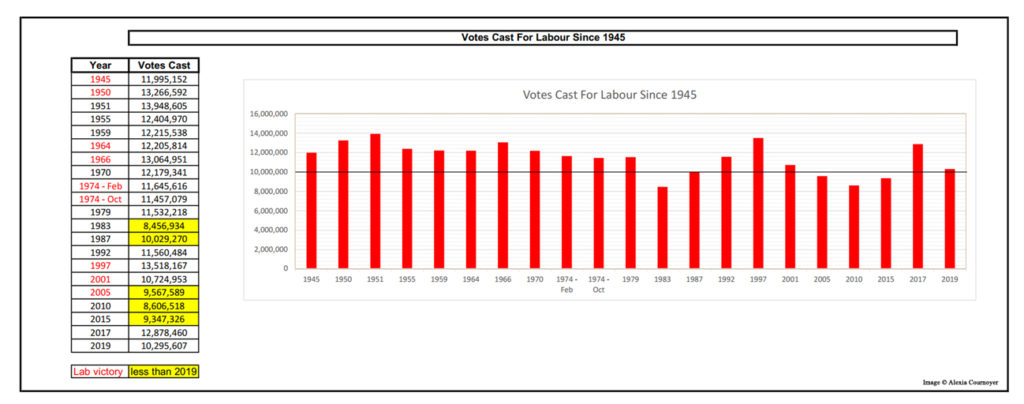
Corbyn Leadership
2013
- Corbyn was awarded the Gandhi International Peace Award for his ‘[…] consistent efforts over a 30-year parliamentary career to uphold the Gandhian values of social justice and non‐violence’.
- Along with Tom Watson, he was honoured by the Grassroot Diplomat Initiative ‘[…]he represents the people through the betterment of society through his actions and agenda’.
2017
- His award was one of three Seán MacBride Peace Prizes awarded that year. The other recipients were Noam Chomsky and a Japanese protest group. Corbyn was awarded his for ‘[…] his sustained and powerful political work for disarmament and peace’.
- Foreign Policy magazine listed him in its Top 100 Global Thinkers list for that year ‘for inspiring a new generation to re-engage in politics’.
Jeremy Corbyn had no ambition to be PM, it was just his luck that he was volunteered to stand as the left candidate at the leadership election just when there was an appetite for a leader that reflected the social democratic values the party claimed to hold, along with a rejection of the Blairite ideology that had lost Labour the previous two elections.
Corbyn’s style of leadership is grounded in consensus. His biggest personality flaw in the eyes of many is that he doesn’t get personal when being attacked and throughout the electioneering period, he steadfastly remained focussed on Labour policy not the behaviour or policies of the opposition.
Unfortunately politics in the UK is adversarial and prefers leaders who can attack and defend, along with a personality that radiates absolutes and confidence. Integrity, honesty and a committent to peaceful resolution of conflict are not valued as highly as the should be. His desire for consensus meant that he constantly strove to include members of the PLP who were actively campaigning against him. Their continued destabilisation of the party contributed to the public perception of a party at war with itself and the members and the need for the malcontents to make public their deeds gave the media many opportunists to damage the Labour brand.
The real question that comes from both Ed Miliband’s and Jeremy Corbyn’s tenures as Leader is a simple one – do the public want a leader with honesty and integrity or would they rather a dishonest, charismatic sociopath? With the election of Boris Johnson, I’d say the latter and from the concerted behaviour of some elements of the PLP, the security services, the media and the government to discredit Corbyn, they appear to agree.
Anti-Semitism
The another attack vector was the anti-Semitism claims. This was an interesting one as I’ve not seen it mentioned in the informal feedback from canvassers and it hasn’t really stuck as one of the main reasons to hate Corbyn – perhaps it’s because on the whole the British population is more anti-Semitic than Labour Party members but the claims proved useful as part of the wall of hate that was constantly thrown at him. That the appeared to be a knee-jerk reaction in the actions of the Party bureaucracy to some complaints and what appeared to be a lack of due process also became fodder for those caught up in it.
Anti-semitism in the party was deliberately weaponised and used against Corbyn in a shameless way. It increased the public perception that Labour and Corbyn were anti-Semitic whilst ignoring the levels of anti-Semitism in other parties and the inaction of those parties in dealing with it. That Labour strove to implement policies and take action against identified anti-Semites was ignored. In a 2018 article,
Also related to this campaign against Labour is the position taken by Stephen Pollard in 2006 and that the Jewish Chronicle newspaper has traditionally been hostile to left wing political parties.
Until he was elected Leader in 2016, discussion around anti-Semitism in Labour were virtually non-existent. There have been no identified reports of Corbyn being anti-Semitic. After his election to Leader it started and became more and more strident and fact free until in the last week of the electioneering period, articles claiming Corbyn was an anti-Semite were being published almost daily.
From 2016, when Labour took its first steps to address the claims of anti-Semitism, to the final election in 2019 the outrage was selectively targetted at Corbyn and Labour, ignoring the obvious anti-Semitism in the Tory party and elsewhere and any rebuttals from the Jewish community were ignored or downplayed with the bare minimum of exposure. During those 3 years there were allegations and negative comments made by Labour Friends of Israel (LFI), Dame Margaret Hodge, Labour Against Antisemitism, the Jewish Chronicle, various rabbis and various other MPs implied ether Corbyn was an anti-Semite or wasn’t dealing with the problem of anti-Semitism in the party. The Board of Deputies president Marie van der Zyl had called Corbyn an anti-Semite and a Lord Sacks, former chief rabbi, compared the Labour Leader to Enoch Powell.
Interestingly there were never any specific proof of these allegations offered at any time, yet the media replayed and amplified these unsubstantiated comments without any demand for facts or investigation. It appeared that that the media considered all allegations fit the narrative of Corbyn being anti-Semitic, so there was no need to validate them.
According to the Jewish Chronicle, what makes Corbyn and others in the Party anti-Semitic is that he only opposes what the Chronicle calls ‘“classic” antisemitism inspired by the far right.’ and fails to oppose what the Chronicle calls left wing anti-Semitism ‘This left-wing, Labour antisemitism updates all the old tropes of classic antisemitism by, amongst other things, overlaying them onto the Israel-Palestine conflict.’ Of course The Chronicle doesn’t give any examples of how anti-Semitism is overlaid in discussions about the Israeli occupation or war crimes in Palestine to help clarify what they meant.
This is where the charge of anti-Semitism is almost impossible to defend for anyone who speaks about the Palestinian issue or demonstrates support. Once upon a time anti-Semitism was just about people who adhered to a specific religion (what apparently is ‘classic’ anti-Semitism these days), it has now been widened by certain groups to include Israel (‘left wing’ anti-Semitism). Which is how Chris Williamson was called an anti-Semite for arranging a showing of the documentary about the Jewish member Jackie Walker being disciplined for being anti-Semitic came to pass.
You can easily see how these semantic arguments essentially close down any rational discussion of the behaviour of Israel towards Palestine, as the only really acceptable term is Israeli government (not even using Israel as a shorthand). Anyone not using that term consistently since before they were born, or being known to have supported Palestine in other ways, quickly finds the content of their discussion is drowned out by cries of anti-Semitism, with the consequential reluctance of Palestinian supporters to continue to speak about Palestine for fear of being branded anti-Semitic yet again. It’s an efficient way of silencing dissent over the behaviour of the Occupying Power (as defined by the United Nations) in Palestine and support for an independent Palestine.
In Sept 2018 after Labour’s adoption of the IHRA,
This is the crux of the matter. Any support for Palestine can, and will, be called out under this banner of ‘new anti-Semitism’ or ‘left wing anti-Semitism’. None of those people who cry anti-Semitism at any criticism of Israel’s behaviour in Palestine ever give their reasons for believing it to be anti-Semitic and they are uncritically accepted and amplified by a media that has its own reasons for attacking the speaker. Even Bernie Saunders, a Jewish 2020 US presidential candidate who lost family in the holocaust and has worked in and supported Israel, has been called anti-Semitic and is currently facing an almost overwhelming barrage of anti-Semitic claims in the media. Whether or no he can refute and silence these propagandists remains to be seen.
There are only two easily identifiable ways to resolve this by policy:
- The Party drops any support for Palestine and members no longer speak about justice for Palestine, or
- It is made clear in the policy that discussion of the behaviour of the Israeli government is not anti-Semitic but any statements supporting Palestine or against Israel that are anti-Semitic will be dealt with, then the claims of anti-Semitism will continue.
The second of these is implicit in the IHRA examples adopted. Back in 2018 Corbyn wanted to add a statement to the IHRA making this explicit but the pushback forced him to drop it. It’s up to Labour to keep making it clear there is a difference between anti-Semitic behaviour and criticism of Israeli policies and behaviours when public allegations of anti-Semitism are made.
It’s a tough ask but it needs to be done or the issue will not go away for whomever becomes Leader.
Terrorism
First of all, let’s refresh our memory about the prizes Corbyn has been awarded.
2013
- Corbyn was awarded the Gandhi International Peace Award for his ‘[…] consistent efforts over a 30-year parliamentary career to uphold the Gandhian values of social justice and non‐violence’.
- Along with Tom Watson, he was honoured by the Grassroot Diplomat Initiative ‘[…]he represents the people through the betterment of society through his actions and agenda’.
2017
- His prize was one of three Seán MacBride Peace Prizes awarded that year. The other recipients were Noam Chomsky and a Japanese protest group. Corbyn was awarded his for ‘[…] his sustained and powerful political work for disarmament and peace’. Corbyn’s office chose not to publicise it.
Even though the anti-Semitism claims take up a lot more column inches in newspapers, in part thanks to some MPs and other vested interests, the terrorist propaganda has been the one to stick in the minds of many voters who turned away from Labour.
There are been credible allegations made of the Security Services providing anti Corbyn propaganda to the established media. Some civil servants have been briefed against him and the former head of MI6 said Corbyn ‘[…] could be a present danger to our country’. All completely unsubstantiated but they fed the unpatriotic, communist and terrorist loving persona that the propagandists were trying to portray and as all were presented as belief rather than fact, the likelihood of successful legal or other action was slight.
IRA Terrorist
There are pictures of him with Ken Livingstone and Gerry Adams from c1983 with a claim that he gave comfort to the IRA by publicly supporting them by sponsoring an Irish Republican event in his constituency in 1983, during the event there were calls made for a withdrawal of British forces from Northern Ireland before a ceasefire would be implemented.
Naturally the truth differs but has never been addressed by Corbyn during his tenure as Leader. This was a mistake for even as late as 5 Dec 2019, The Sun was using his support for this event to allege that Corbyn was a terrorist sympathiser. During the 1980’s Corbyn had been calling, along with the rest of parliament, for an end to the violence and had made contact with Sinn Féin (the political wing of the IRA) during this time.
As Ken Livingstone wrote in 1994 of that period.
‘When I first met Gerry Adams and Danny Morrison in February 1983 they made clear to me then that Sinn Féin accepted there could never be a military solution to the problems of Northern Ireland, that they wanted a negotiated settlement that would be acceptable to the Unionists and a united modern European state in which Unionists would wish to play a full and equal part.
It was always clear to those of us who began the dialogue with the present leadership of Sinn Féin that far from conforming to their depiction by the British government as ‘godfathers of crime’ and ‘cold-blooded psychopaths’ in fact they represented Britain’s best chance of a negotiated settlement.’
and on ITV, April 2000, Livingstone defended his use of the term ‘freedom fighters’
‘That is how the IRA saw themselves. They were prepared to die – 10 starved themselves to death. That’s not what a criminal or godfather of crime does; it’s someone who believes they’re fighting for the freedom of their country and you’ve got to deal with them on that basis.’
Wreathgate
In 2018 there were allegations of him laying a wreath to terrorists involved in the 1972 Munich attack. Since then the misinformation has recurred on social media posts and occasionally referred to on other media platforms. Despite a 2014 article written by Corbyn in the Morning Star describing the event, subsequent post 2016 rebuttals from Corbyn, the Labour Party press office and at least one complaint to the press regulator, the tale has taken on a life of its own.
The allegations keep recurring because the US and Israel allege that some of those buried in the cemetery were members of terrorist groups. This has been denied by the groups and others and the claims have never been substantiated but that’s never stopped the Daily Mail before. Even the President of Israel tweeted the allegation and Corbyn refuted it. It would appear this had ‘legs’ as it provided ‘proof’ Corbyn is both a terrorist supporter and an anti-Semite.
Being A ‘Friend’ To Terrorists
The English language is quite limited when it comes to addressing groups of people. You can call people you work with ‘colleagues’, people within your group ‘associates’ but when trying to be inclusive, the left traditionally uses ‘friends’ or if the solidarity is more pronounced, ‘brothers and sisters’ is used as a generic collective noun. Corbyn calls groups ‘friends’ – whether they be Irish, Jewish, Muslim or anyone else and so this has been used as another weapon to destroy his character, particularly in the propaganda calling him a terrorist.
Without the context, it’s easy to see why people misconstrue the term as it’s no longer in common use. Even the term brothers and sisters is only used during union rallies and places like the Durham Miners Gala and Justice for Orgreave protests and thankfully comrade is well and truly out of fashion.
Letting Terrorists Out Early
This is another story that demonstrates the bias in the media. The story of the London Bridge attack should’ve been about how the government had cocked up and released a terrorist part way through his sentence with out any probation service monitoring. Because Corbyn gave a nuanced response from the perspective of jail being for punishment and rehabilitation, yet the media reports focus on ‘Jeremy Corbyn says convicted terrorists should ‘not necessarily’ serve their full prison sentence.’
There always has to be an assumption that the media will not report fairly statements made by Labour Leaders. This was a problem for Ed Miliband too. The pledge for Labour to be transparent and to answer questions honestly and with nuance just create a target for the media to be able to misrepresent what is said. With Blair, the media had been against him up until just before he was elected in 1997 when he went to Australia to kneel before Murdoch. After that the Sun supported him and he was elected. Within months of his election the Sun had once more turned on him, calling him the ‘most dangerous man in Britain’. Does that ring any bells?
One of the more overt low level propaganda attacks during this period was the posting of a manufactured claim that Corbyn had posted a tweet saying ‘A man was murdered by British Police in Broad daylight’. This gained a lot of traction on social media and played to the belief of Corbyn being unpatriotic. In an ideal world, finding the first poster of this (very professionally done) tweet image would possibly lead us to the answer of the question whether or not there was an organised attempt to destroy the reputation of Corbyn using social media.
Internet Propaganda
There’s two types of propaganda here:
The first internet propaganda type is the distribution of misleading information against Labour that is designed to discredit or undermine the reputation of the party or party members and can be directly attributed to other political parties.
In October 2019 Facebook confirmed that political ads were exempt from the Facebook community standards requirement for them not to lie. So the Conservative Party ran with that and subsequently paid for internet ads of which 88% were found to misleading or untruthful. It’s not only the Conservative Party that were running misleading ads, there were claims the Liberal Democrats were at it too.
There was also the issue of the official Conservative Party Twitter page pretending to be an independent fact checking site to mislead people during one of the televised debates and their deployment of websites that claimed to host the Labour manifesto and were advertised as such on Google but were actually anti-Labour propaganda.
What can Labour do in future to counter this? Not a lot, except to constantly remind people every chance they get that the government were dishonest in their campaign. Let’s face it, even a few days into the new government they’re already backtracking on promises that were made, so you’re spoilt for choice when it comes to calling out Conservative Party dishonesty. At the end of this parliamentary term, if you’ve managed to get the consistent message of Conservative dishonesty out then you will be all the better for it come next election.
The second internet propaganda type is the guerrilla propaganda against Labour that has been quite overt on Facebook but is also on Twitter. If this is a deliberate effort to damage Labour by the constant flow of opinions designed to influence voters against Labour, who are the unknown actors who authorised the creation of these accounts, who provided the details of the propaganda to be used and who controls these accounts and who executes the strategy.
This one is interesting and I’ve yet to find any clear evidence or substantiated allegations. There have been allegations made that GCHQ troll farms for hire have participated in anti-Labour propaganda but if there is a directed effort to use this kind of propaganda, the troll farms could be under the control of any organisation that sees a benefit from denying Labour government.
On Twitter, a lot of the accounts used to disseminate the propaganda don’t fit the expected profile you would expect of accounts of the age they are. Most of the accounts that appear to engage in reputational damage are years old but don’t have a profile picture, have very few followers, their Twitter handle has the default string of numbers from the original set up and they appear to have spent their entire tweet output either supporting right wing parties or tweeting anti-Labour propaganda. Since the election, some have vanished and the tweets removed. It is quite possible they will now lie dormant until the next time they are required.
Like Twitter, Facebook encourages people to ‘friend’ accounts they have never actually met but unlike Twitter it is not easy to see how old the account is. There were a large number of accounts who were members of the Labour supporting Facebook groups who posted this propaganda – ostensibly as Labour supporters who were concerned about [insert your choice of smear], in the forums it was sometimes challenged but very rarely were these accounts asked for proof of their allegations and in the spirit of transparency these posts were left on the forums to continue their misinformation.
Short of Twitter and Facebook allowing a review of IP addresses and other details, it’s almost impossible for Labour to identify troll farms. All that can be done is for Labour supporters on these platforms to be aware of the misinformation and to challenge it by asking for proof and then replying with the rebuttal. It’s more difficult for supporters than just blocking the account but it is one of the easiest ways to give the correct information to someone if they’re actually not a troll but a good faith actor with bad information.
Media
The media are by their very nature as partisan as they believe their readership to be. The only exception is usually an election ‘purdah’ where they are expected to report objectively. That didn’t happen this time and the media continued to behave in an openly partisan way in their approach to the two parties. In the print media, some of this can be attributed to media ownership being concentrated in a few, high net worth hands and all of which are offshore entities. These owners will be financially disadvantaged Labour government policies, so naturally it’s in their best interests to ensure a sympathetic Conservative government is elected. The journalists themselves come from a very narrow social and educational group, so of course their attitudes and behaviours are those of their network.
Labour recognised this in its manifesto and was aiming to make changes to widen the socio-economic background of those employed by the media but it’s not that simple, the UK is not a meritocracy, it has always relied on networks and the members of that network help each other. This is true for all sides of politics and all other spheres of life. When Marx warned of monopolies of capital distorting the markets, he was only partially right, monopolies of in any form cease to work for the common good and overtly work for themselves. Don’t diss Marx out of hand, his economic analysis is pretty spot on even now, his sociology on the other hand could be considered pretty ropey.
The only real way to neutralise the established media is to widen media ownership and encourage recruitment from a wider socio-economic base. It’s unfortunate that both of these approaches can only be done in government and the second policy can only be done by the government in the areas of the media where they have control. Campaigning for the next 5 years for the widening of the pool that media roles are filled from lays the groundwork. Even campaigning against the concentration of media ownership may not be a bad thing, if the last 40 years are anything the go by, the media are always going to be against Labour so upsetting the media barons will probably not noticably intensify the attacks on Labour anyway.
Down the last decade people have begun to work around it by using social media to get their news and independent media outlets have taken advantage of this and have widened their readership. Unfortunately it’s the older voters who still use traditional media outlets (radio, newspapers and tv) and they are both more likely to cast a vote and to vote Conservative.
Traditional print media will never be favourable to Labour as their social and fiscal positions are far more conservative than Labour. This is the 2017 survey by YouGov on vote by readership.
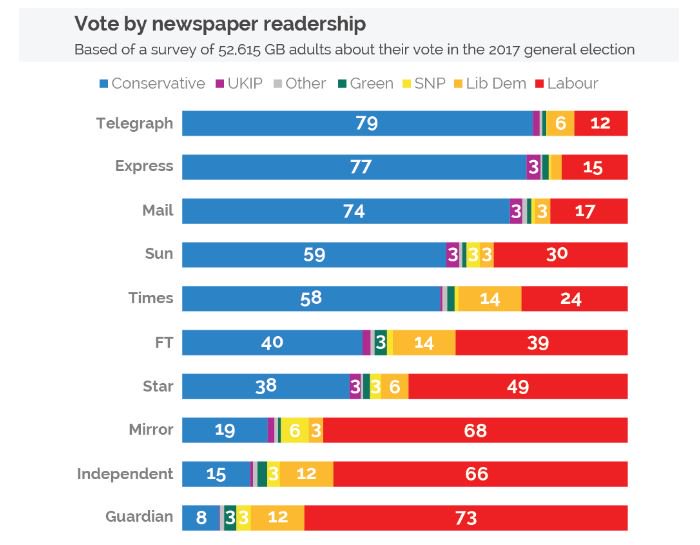
Using data from politicalcompass.org, this is the political opinions of newspapers versus party positions.
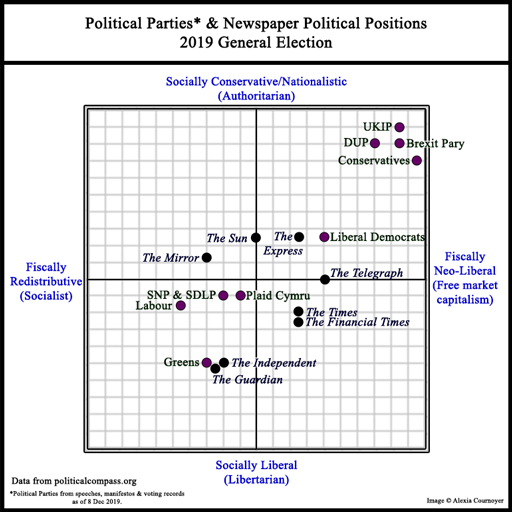
Note that no newspaper matches the position of Labour. The Mirror is more socially and fiscally conservative than Labour and The Guardian is more fiscally conservative but more socially liberal. Which is in keeping with their stated support for the Liberal Democrats – except the Liberal Democrats have moved to a more pronounced social and fiscally conservative position.
Social media on the other hand does provide Labour with an unfiltered outlet to promote its policies and candidates. The chances of converting people who are not currently voters or who are voters but can have their minds changed is greater than through traditional media, only because the traditional media curates what it presents and traditionally does not present Labour in a positive light. There’s no escaping this, no matter how much we wish for it.
Enhancing the social media presence and deploying a team to monitor the propaganda and counter it on social media is critical to expanding the voter base. It will become more important as the years pass, when the older Conservative voters die and the younger voters, who are more sympathetic to Labour, become the majority.
Labour is Fiscally Incompetent and/or Crashed the Economy
When you had Labour MPs parroting this line after Labour lost government, you can’t be surprised if the media keep reporting it and people keep parroting it. Those MPs should’ve been slapped down by central office sharpish. They weren’t and you made a rod for your own back. Calling in favours to get that IMF report was too little, too late.
Don’t do it again.
Labour needs to begin now with an easily repeatable point that Labour has never been fiscally irresponsible, the financial crash was the fault of the US financial system and the UK exposure to the US always leaves us vulnerable and for max points, it should become a mantra to point out that the Tories had borrowed more in the first 5 years of office than Labour had done in the previous 13 years, that the Gross Debt has consistently been above 60% GDP since they took office and the only reason the deficit is so small is interest rates are low.
You might also like to ask the government where the additional £1.2 trillion they have borrowed has gone, along with the money taken from the NI pot, the sale of government assets and the money taken from the miner’s pension fund. It certainly hasn’t been spent on public services, since funding to those has been cut to the bone. They’re also driven to waste money in pursuit of their ideology, for example, the cost of DWP appeals outstrips the cost savings.
There’s 5 years to repeat this mantra enough when the opportunity presents itself so that it percolates through to voters but it’s one of those things that needs to be a constant mention – along with any other points that can be used to highlight the incompetence of this government. That during the 2019 election the Tories could bring up the ‘fact’ that Labour left the finances in a mess in 2010 and they were still struggling to repair the damage and it wasn’t rebutted leads people to believe it’s true because you do nothing to deny it. I have no idea how you square away the erroneous mea culpa’s from MPs, good luck with that.
Labour Was ‘Too Left Wing’
In 2017, Political Compass also produced a data mapping of political party positions have moved down the years. You’ll notice that in the years that Labour supported fiscally and socially conservative policies, their vote share was lower than usual.
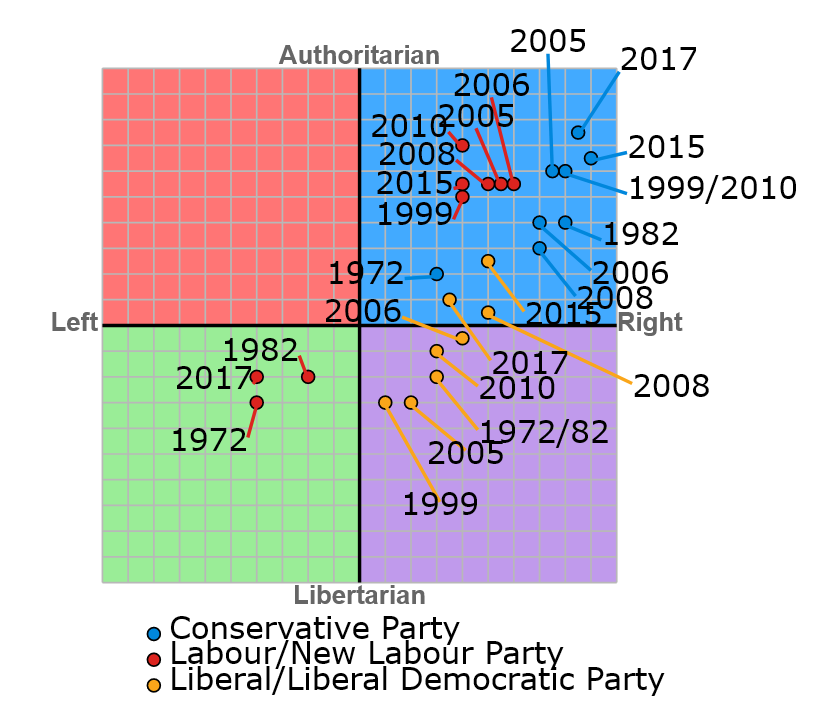
The takeaway here is that when Labour moves to the right, it generally loses votes. Despite the claims of Labour ‘centrists’, a lurch to the right will not bring back voters, unless voters decide they like austerity but finally recognise how dire the Conservative government actually is and then correctly ascribe the blame to them, rather than to the mythical bogeyman of the EU or believing (as demonstrated by vox-pops post 2019 election) that Labour has been in power.
Labour Doesn’t Appeal to the Working Class.
Here is a breakdown of votes by class from the 2017 GE. The takeaway is that from at least 2017 onwards, socio-economic identity politics no longer is a factor in voting intention. So yes, Labour has lost their ‘core vote’ and now needs to appeal to all stratus of society.
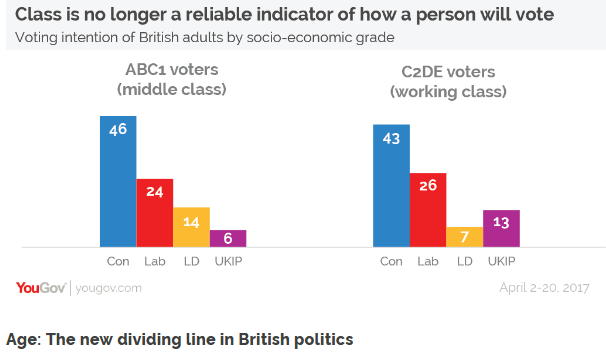
But that needs a closer look.
If you look at the GE2019 results provided by Lord Ashcroft Polls, broken down by gender, socio-economics and age, you can see that it’s gender and age rather than class that determines a Labour voter.
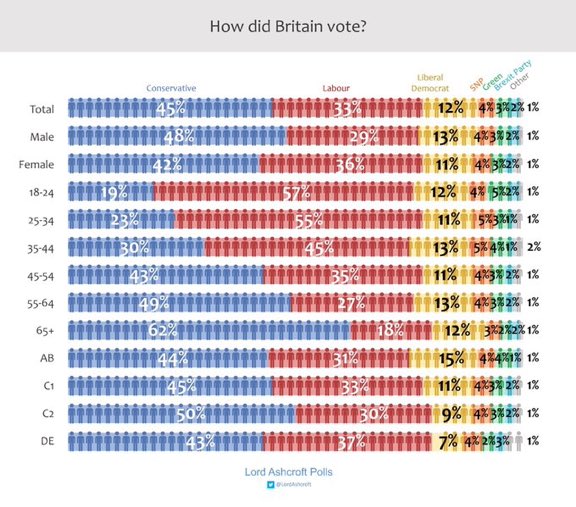
So more women than men vote Labour and more people under 45 vote Labour than Conservative. Ignore this at your peril.
If you really need convincing of this, look at this breakdown of the median age of GE2017 constituencies won by the various parties (author unknown, if anyone could point me at where it came from I’d appreciate it).
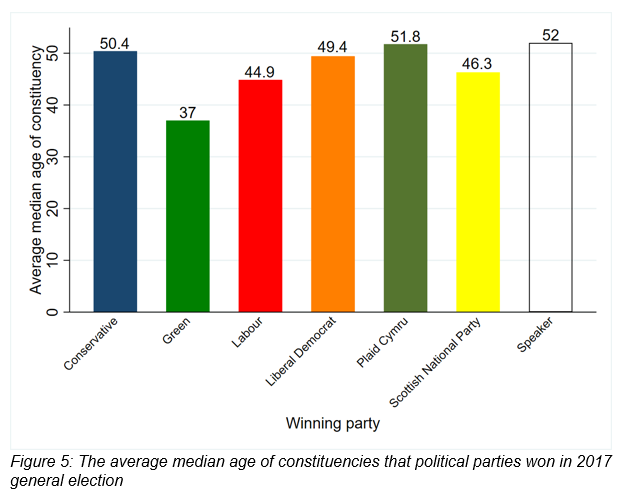
What needs closer attention is the historic and GE2019 data on voters age, gender and socio-economics in the seats lost or not taken from the Tories. Only then can any claims be made about whether the working class vote is really gone, or if was even actually there to begin with.
Voter Alienation
Voter Alienation isn’t new but it first raised its head during the Blair years when ‘the Westminster bubble’ term became widely used. Since the 1980s both sides have been guilty of neglecting of the declining industrial areas by failing to replace the dormant industries with quality employment opportunities and prosperity and in the case of Margaret Thatcher’s government deliberately delivering a managed decline. Moving the BBC to Salford near Manchester and C4 to Scotland is nothing more than a sop.
Certain elements of the media have consistently pushed anti-EU and anti-immigration agenda, which Labour has never tried to counter. In fact, Labour embraced the anti-immigrant stand during the tenure of Ed Miliband as Leader, to the extent of producing anti immigration mugs as part of their brand marketing during the 2015 election. Nothing says pandering to English Nationalism more than the son of an immigrant pushing to curtail immigration.
What this ignores is that when there’s an economic decline, people affected begin to look inward, when people feel prosperous they are more generous to those they think of as ‘others’.
Yet voter alienation is also a product of the media and the way it portrays the north and working class. No one ever bothers to explain to the public the reasons why things happen. From empty high streets, to overcrowded classrooms the economic reasons for decline are never spoken of. I know the average UK voter seems to revel in being economically and politically illiterate but seriously, this has to stop – the long running media campaign against the EU contributed to the EU being blamed for multiple failings of Westminster – this was never explained during the Brexit referendum (or any time at all), hiding from the consequences of government policy and allowing the EU to take the blame is cowardice and you’ve paid the price.
Some of the first questions to possibly ask those alienated voters are ‘What are your aspirations?’ and ‘How do you think you’ve been failed by Westminster?’ Then you’ll have to think of some kind of education programme you can roll out to the masses to make them understand the limitations of Westminster both in and out of office to fulfil them. Some kind of basic education of how the political system works might be in order too. As the unions to help as the media and the government certainly won’t.
Brexit
The most surprising thing to me (and remember I haven’t seen any of the data) is that Brexit was still a big issue after one previous UK and EU elections. I thought that the two previous votes (the 2017 GE and the 2019 EU votes) would have defused some of the tensions around Brexit. Obviously not. This is an interesting read from a leave position and observes that this issue of Brexit is seen in some quarters as the revolt of alienated voters against the Westminster. A better person than me may be able to untangle the position to give it some kind of rational base other than defiance of what those ‘liberal elites’ wanted. The inconsistency of the leave position demanding their democratic vote be upheld yet crying foul when they’re offered another chance to exercise their democratic voice over the deal is inconsistent. Inconsistency and an absence of logic appears to be the hallmark of Brexit.
Johnson swayed the electorate with the oft repeated slogan, ‘let’s get Brexit done.’ Labour should’ve countered this with the slogan ‘let’s get Brexit right.’ for that was the policy, as agreed over two conferences, that Labour would take.
The decision to try to force an election and then negotiate a new deal from the position of government was a sound one. From a remainer’s point of view, putting the new deal and the option to remain looks rational – with the discovery of fraud and foreign interference in the original vote and the now identified economic impact should’ve been the high ground for another vote and with all the facts should’ve been an easy sell. Yet somehow it wasn’t. The intransigence of some elements of leave voters ‘you lost, get over it’ and then claiming victimisation and marginalisation when a new vote was campaigned for was a toxic mix that couldn’t just be brushed aside.
The problem was that after years of Labour ignoring the fraud and interference in the vote and saying they’d support ‘the will of the people’ – no matter how manipulated that will was, at the last moment they appeared to change their minds and go for the second vote and then after parliament passed the first reading of the exit deal, agreed to an election.
That was madness.
At that stage it seems there was no polling showing that Labour could win, it appears that the decision to support an election was made in the belief that just like in 2017, once the media was forced to report fairly they would make up ground. In a quite surprising move, the media ignored the rules of purdah, the PM behaved dishonourably both in refusing to face the media and lying, the Conservative party produced what should’ve been considered an insulting manifesto that was light on detail and uncosted, the national media didn’t hold the government to account and Labour looked like it was panicking when it suddenly switched its focus of the election campaign to the NHS and Waspi women.
But it was the failure to convincingly sell the reasons why idea of a second vote was a good one that mainly lost Labour its seats. The consequences appears to be that Labour leave voters rated ‘having their vote respected’ and leaving the EU on any terms more highly than a redistributive social policy or even saving the NHS. Whether they voted Tory or for the Brexit Party, the mantra of ‘Get Brexit done’ was strong, and combined with the steady drip of anti-Corbyn propaganda that has been saturating both the traditional media and social media, was enough to repel anyone who was only casually (or not at all) engaged in politics.
Rather than take this claim at face value, a more nuanced approach may be needed. This article by Ipsos Mori is food for thought.
My Suggestions
Along with the suggestions above here’s a few more that may help improve the perception of Labour.
PLP and ex MPs
- Stop shitting in your own nest by being disloyal and publicly displaying your infighting as some kind of ridiculous badge of honour.
Labour Party
- The media are not your friend, you need to have more personal contact with your voters. Identify your target voters and take a leaf from Momentum’s play book and go out to the grass roots. You’re gifted with an engaged membership, don’t abuse it, use it.
- Develop and consistently implement a digital communications policy. Ignoring the new reality of how people get their information is a bad decision.
- Don’t let slurs on any media platform slide. There’s no benefit to turning the other cheek and hoping the voters notice how worthy Labour is – it’s not going to happen, as most voters don’t care for anything more than sound bites. Yes, we’re all aware that the lies and misinformation is always amplified more than any response and that mud sticks but you can’t ignore this and if it means legal action, complaints to regulators of what have you, do it. It’s your reputation your supposed to be protecting.
- The best new voters to get are those c35% who don’t currently vote. They appear to have no strong allegiances (certainly not strong enough to make them spend half an hour voting every few years) and so could be brought into the Labour fold. In business it always takes more effort and costs more to get new customers and with political parties it’s the same but voters who are prepared to switch are not a good long term proposition as a new voter who chooses Labour and stays loyal.
- Don’t respond to the crises manufactured by the media and people of ill-will towards the party or leadership. Chris Williams was right, Labour became too apologetic and too reactive over the anti-Semitism claims and that behaviour created a stick that generated more bad headlines than it should. Apologising and knee-jerk reactions only continues the bad news cycle. Just like the SNP coalition claims, you don’t need to keep jumping to assure people that it’s not going to happen as that looks shifty – just do the equivalent of a heavy sigh and say that it is not Labour policy to enter coalitions.
- When people and organisations come at Labour over some perceived slight that is common across all parties, acknowledge it. Then point out the hypocrisy of them ignoring other parties to target Labour and refuse to engage further. Similar behaviour is used to deal with the old fashioned online trolls and it closes down any further attack opportunities.
- Set up a myth-busters page and every time you see propaganda refute it on social media, via press releases and all other channels and publicise it so members and supporters can go to one place to get the facts. People knowing about that web page and going to there to get the rebuttals are your best bet in combatting the pernicious propaganda that will always follow Labour and the last few years has seen an avalanche that is almost unmanageable without somewhere to go for reference.
- Bring in mandatory selection prior to each election. You need your grass roots support for canvassing and the like and denying them a chance to change their MP if they don’t feel they’re performing, should be something those members expect in return for their support and time.
- Get yourself a decent PR/brand management firm to get your key points across, don’t just leave it to election time. The Conservatives constantly drip feed anti-Labour propaganda which is uncritically amplified by the media and Labour needs to be countering this misinformation whenever it occurs.
- Unless you’ve got absolute proof that people outside cities are unreconstructed bigots, ignore the calls that say you are no longer relevant to those outside the cities. Those voters want the same things city voters want, decent pay, the NHS, well supported schools and the like. There are local issues that do affect certain constituencies but the low level propaganda that says Labour is the party of North London luvvies is just that, propaganda and as such it needs countering. Having a more representative voices as spokespeople and giving input into party decisions can only benefit the Party and make it stronger.
- Stop whatever turf war is happening in the Party central office. Follow the disciplinary process and make it apply to all members who breach Party rules – including ex-PMs if they are found to have breached the rules. Not taking action against the more high profile members is basically saying that some people in the Party are above the rules and that makes a mockery of any claims that the current government also ignores the rules.
- Don’t lurch to the right. There’s more than enough parties in that area, they’ve been doing it for longer and are a lot more sucessful at it.
Labour Leader
- Don’t treat traditional media as an objective purveyor of the Labour message. They never have been and never will be.
- In a world of lies and propaganda, nuance and transparency are an open invitation to be misrepresented. Stop it.
- If your PLP start to conspire against you don’t give them the benefit of the doubt, nip it in the bud or it will come back to haunt you.
I’ll leave you some parting words from the late Anthony Wedgwood Benn:
‘Every single generation has to fight the same battles again and again and again.
There’s no final victory and there’s no final defeat.’
New Book: How Can They Say That? Authoritarianism and the rise of English Nationalism is released in May 2020.




